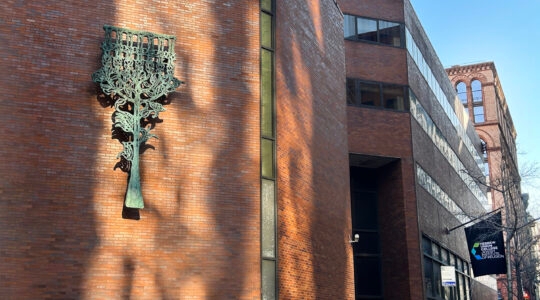Jerusalem — Have the liberal streams of Judaism been left at the altar by the State of Israel, or can they forge an historic union in their quest for recognition? That’s the issue at the center of the Conservative movement’s annual Rabbinical Assembly convention, attended by some 350 American rabbis here.
Some rabbis say they should support the Neeman Commission’s proposal to create conversion institutes, to be taught by Orthodox, Conservative and Reform instructors — with or without the approval of the Orthodox chief rabbinate.
But others feel just as strongly that, in light of the chief rabbis’ harsh repudiation of non-Orthodox Judaism last week, the Neeman proposals are dead.
“We are the groom but it seems the bride is not willing to come under the chupah,” asserted Rabbi Ehud Bandel, referring to the chief rabbinate.
He is head of the Conservative movement in Israel, known as Masorti, and one of seven members of the Neeman Commission.
“We have other Orthodox partners who are more courageous and realize that the Masorti movement is alive and well and growing and can’t be ignored any longer,” Rabbi Bandel said.
Rabbi Bandel said the movement would continue to seek a court order requiring the government to register as Jews those the Masorti movement converted here.
But he noted that the court clearly does not want to tackle this issue because it postponed until March 22 a hearing on a government request for a 60-day delay of the proceedings. And he suggested that in the meantime a so-called technical solution be pursued in which the state would agree to recognize Conservative and Reform conversions.
The statement from the chief rabbinate last week said “There can be no cooperation” with those “who try to shake the foundation of the Jewish religion,” a clear reference to the Reform and Conservative movements, who the chief rabbinate blamed for rising assimilation rates.
Observers say that while the liberal branches are still smarting from the sting of the chief rabbis’ criticism, they no doubt ultimately will agree to the proposal of the joint conversion institute since this would greatly enhance their status in Israel.
Gideon Meir, the Foreign Ministry’s adviser on world Jewish affairs, told the rabbis that reconciliation with the chief rabbinate was not necessary and that they should carry out the recommendations of the Neeman Commission. That is something the rabbis said they could not do because the commission’s proposal recognizes the primacy of the chief rabbinate over conversions.
The outgoing president of the Rabbinical Assembly, Rabbi David Lieber, called it a “sad commentary on the state of Orthodoxy” that the chief rabbinate refused to work with the non-Orthodox, a proposal formulated by the government-sponsored Neeman Commission.
“How can you say, ‘We are wise and the Torah of God is with us,’ when your actions belie your responsibility to bring people closer to God, not to alienate them?” Rabbi Lieber asked rhetorically of the chief rabbinate in his address to the convention.
In the end, the rabbis decided to send a letter to Prime Minister Benjamin Netanyahu expressing their willingness to “support any compromise — such as the establishment of a joint conversion institute, an appropriate administrative solution, or any other proposal — that is acceptable to all sides and which guarantees the integrity of the Jewish people based on mutual respect. …”
They asked also that Netanyahu seek to cancel a Knesset vote scheduled for Tuesday that would support the Neeman Commission proposals. The rabbis said such a vote would be interpreted as applying pressure on them to accept the proposals, which they refuse to do without the cooperation of the chief rabbinate.
But a government official closely involved with the Neeman Commission expressed confidence that the Knesset would vote overwhelmingly to support the effort. This would pave the way for the government to establish joint conversion institutes.
Rabbi Joel Meyers, executive vice president of the Rabbinical Assembly, said he believed there was no support for a technical solution in which the government would keep lists of converts, but that other administrative solutions might be possible.
Rabbi Alan Lavin of North Woodmere, L.I., said keeping lists of converts “was offensive to Jewish and moral values. It’s not the Jewish way. In the Holocaust, the Nazis made lists of who it found acceptable.”
There were also those rabbis who believed the statement should have forcefully rejected any working arrangement with the chief rabbinate.
Rabbi Ismar Schorsch, chancellor of the movement’s Jewish Theological Seminary, said the movement should have called for the creation of rabbinic courts established by modern Orthodox rabbis willing to work with Conservative and Reform rabbis.
He said there is a “public revulsion” against the chief rabbinate that has been reinforced in the last week and that this would have been an opportunity to “put it out of the conversion business.”
In his address to the convention, the head of the Reform movement in Israel, Rabbi Uri Regev, suggested asking the Knesset to disenfranchise the chief rabbinate.
One of the Orthodox rabbis with whom the Conservative movement said it could work with, Naftali Rotenberg, was enthusiastically received when he told the convention that at least 40 of the 90 Orthodox rabbis of Israeli communities favored civil marriages. Were that adopted by the Knesset, it would for the first time allow Reform and Conservative rabbis to perform marriages after a civil ceremony.
The new president of the Rabbinical Assembly, Rabbi Seymour Essrog of Baltimore, said that despite the dispute with the chief rabbinate, he planned to encourage his colleagues to continue congregational tours of Israel and support for the United Jewish Appeal, Israel Bonds, the Jewish National Fund and the Masorti Movement.
On the opening night of the convention, Labor Party leader Ehud Barak drew applause when he told the rabbis that the Orthodox-inspired bill to legalize only Orthodox conversions in Israel was dead.
The bill passed one of three required readings and Barak said that if it was brought to a vote again, his party “will not allow it to pass.”
The New York Jewish Week brings you the stories behind the headlines, keeping you connected to Jewish life in New York. Help sustain the reporting you trust by donating today.




